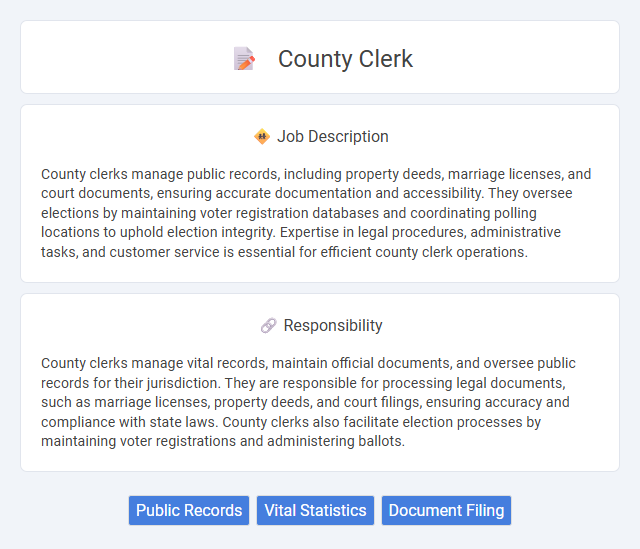
County clerks manage public records, including property deeds, marriage licenses, and court documents, ensuring accurate documentation and accessibility. They oversee elections by maintaining voter registration databases and coordinating polling locations to uphold election integrity. Expertise in legal procedures, administrative tasks, and customer service is essential for efficient county clerk operations.
Individuals with strong organizational skills and attention to detail will likely find the county clerk job suitable, especially if they enjoy managing public records and interacting with diverse members of the community. Candidates who are comfortable with administrative tasks, legal documentation, and maintaining accuracy under pressure may have a higher probability of success. Those who prefer dynamic, fast-paced environments with frequent interpersonal communication might also find this role fulfilling and well-matched to their abilities.
Qualification
A County Clerk typically requires a high school diploma, though many employers prefer candidates with an associate or bachelor's degree in public administration, business, or related fields. Essential qualifications include strong organizational skills, proficiency in office software, and knowledge of record-keeping and legal documentation. Experience in government or administrative roles enhances a candidate's ability to manage public records, process licenses, and support election procedures efficiently.
Responsibility
County clerks manage vital records, maintain official documents, and oversee public records for their jurisdiction. They are responsible for processing legal documents, such as marriage licenses, property deeds, and court filings, ensuring accuracy and compliance with state laws. County clerks also facilitate election processes by maintaining voter registrations and administering ballots.
Benefit
County clerk jobs likely offer valuable benefits such as comprehensive health insurance, retirement plans, and paid leave, which contribute to job security and employee well-being. The role might also provide opportunities for professional development and stable work hours, enhancing work-life balance. Employees could probably expect access to resources and support that improve overall job satisfaction.
Challenge
The county clerk job likely involves managing complex administrative tasks that require strong organizational skills and attention to detail, which can present ongoing challenges. Handling a high volume of public records and ensuring accuracy under time constraints may contribute to potential stress. The need to stay updated with evolving legal and procedural requirements could further increase the difficulty of maintaining compliance and efficiency.
Career Advancement
A County Clerk position offers valuable experience in public administration, records management, and legal document processing, creating a strong foundation for career growth in government and legal sectors. Mastery of electoral processes and compliance regulations enhances qualifications for advanced roles such as Deputy Clerk, Chief Clerk, or positions in county government administration. Continuous professional development and certifications in public administration or records management can significantly boost opportunities for leadership and specialized roles within local government.
Key Terms
Public Records
County clerks manage and maintain comprehensive public records, including property deeds, marriage licenses, and court documents, ensuring accuracy and accessibility. These officials coordinate the filing, preservation, and retrieval of governmental documents critical for legal and historical reference. Their role supports transparency and public trust by providing timely access to official records for citizens, attorneys, and government agencies.
Vital Statistics
County clerks manage vital statistics by recording and maintaining official records such as birth certificates, marriage licenses, and death certificates. They ensure accuracy, confidentiality, and legal compliance in processing these documents. Their role supports public health data, legal identification, and demographic research essential for government operations.
Document Filing
County clerks play a crucial role in document filing by managing and maintaining official records such as legal documents, property deeds, and court filings. Their responsibilities include accurately organizing, indexing, and safeguarding these records to ensure easy retrieval and legal compliance. Efficient document filing by county clerks supports transparency and accessibility in public recordkeeping.
 kuljobs.com
kuljobs.com